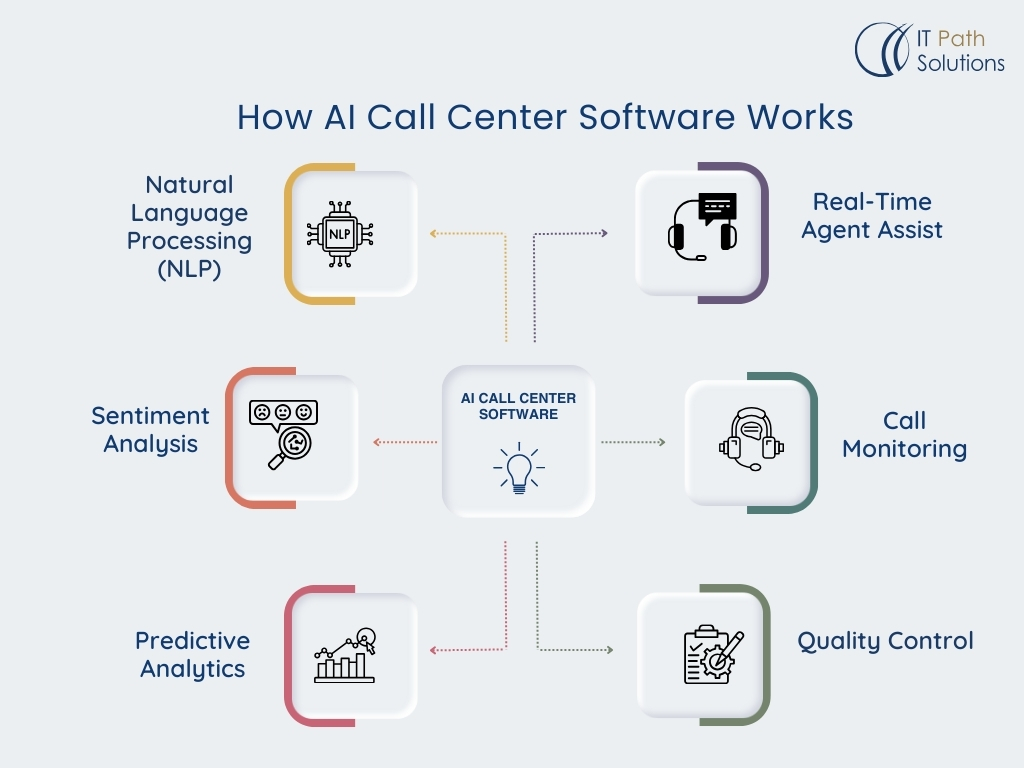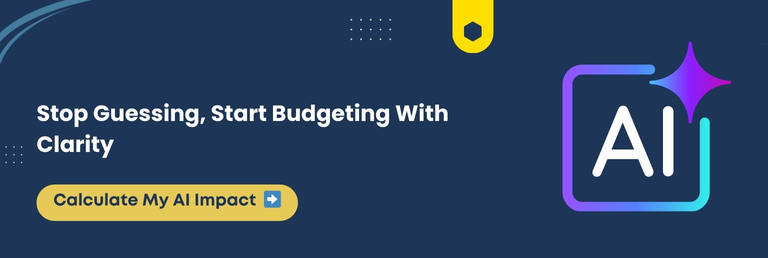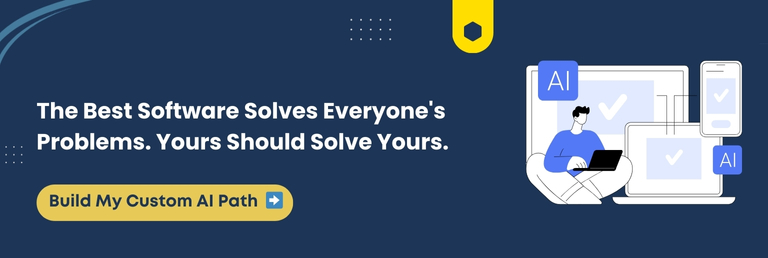Home
»Blog Insights
»The Complete Guide To AI Call Center Software: How It Works, Key Features & Top Picks
The Complete Guide To AI Call Center Software: How It Works, Key Features & Top Picks
Keyur Patel
September 12, 2025
20 min
You will be surprised to know that agentic AI will autonomously solve more than 80% of typical customer service issues by 2029, and that too without human involvement.
It means the familiar frustration of long hold times, repeated explanations, and inconsistent resolutions is quickly being replaced by conversations that feel fluid, responsive, and individualized.
Here’s the challenge: with so many call center solutions competing for attention, how do decision-makers know which platforms genuinely improve service, reduce costs, and empower teams, rather than adding another layer of complexity?
It is where AI call center software becomes transformative. Unlike traditional systems, these platforms use natural language processing, real-time sentiment analysis, and predictive insights to create experiences that connect customers and agents seamlessly.
From routing calls intelligently to providing automated summaries, AI is changing not just the speed of service but the quality of every interaction.
This guide is designed for business leaders, technology buyers, and customer experience professionals who want clarity and confidence when exploring AI call center solutions.
Here, you will learn about what technology is, how it works across the customer journey, its benefits, use cases, costs, future trends, and how to choose the best AI call center software in 2025.
So, let’s get started.
What Is AI Call Center Software?
AI call center software is more than just an upgraded phone system; it blends artificial intelligence with automation to create a contact center that learns from every interaction, supports agents in real-time, and delivers faster, more personalized customer experiences.
Unlike conventional setups, AI-driven platforms rely on cloud infrastructure, advanced algorithms, and data analytics to transform how customer support operates.
Here is what set it apart:
- Clear Definition: AI call center software employs machine learning (ML), natural language processing (NLP), and automation to manage customer interactions across voice, chat, and email.
- Beyond Traditional Systems: Traditional systems depend on manual routing and static scripts. In contrast, AI-powered call centers adapt dynamically by analyzing customer needs in real-time.
- Cloud vs. On-Premise: Cloud-based AI call centers allow flexible scaling, speedier updates, and remote access. On the other hand, on-premise systems may offer superior control but require heavy infrastructure and higher maintenance.
- Contact Center AI Platform: Modern platforms unify voice, chat, email, and social channels. It makes them an omnichannel hub for customer engagement.
In short, AI call center platforms represent the shift from reactive service to predictive and proactive customer care, where technology assists agents rather than replacing them.
The Crux: AI call center software redefines customer service by merging automation, analytics, and cloud scalability into a consolidated platform. It facilitates quicker, savvier, and more consistent interactions than traditional systems.
How AI Call Center Software Works
At its core, AI call center software learns from customer interactions, adapts to context, and assists both customers and agents in real-time. It not only replaces tasks; it enhances the entire customer journey from the moment a call begins until resolution.
By blending automation, machine learning and analytics, AI ensures every step feels more rapid, accurate, and personal.
Here is how it works across the customer journey:
- Natural Language Processing (NLP): AI interprets customer speech or text to understand intent, detect urgency, and provide relevant responses instantly.
- Sentiment Analysis: Algorithms analyze tone and language to assess whether a customer feels frustrated, satisfied, or confused. It enables AI agents to respond with empathy.
- Predictive Analytics: AI anticipates customer needs by reviewing past interactions, purchase history, or issue patterns. It helps route calls proactively.
- Real-Time Agent Assist: While customers speak, AI tools suggest responses, highlight policies, or recommend knowledge base articles. It reduces handling time by up to 30 percent.
- Call Monitoring and Quality Control: Supervisors gain AI-driven dashboards that score conversations, flag compliance risks, and recommend coaching opportunities.
Together, these technologies transform static customer support into a dynamic process that constantly adapts to context and intent. AI-driven call centers not only resolve issues but also anticipate them, reducing effort for customers and stress for agents.
Core Insight: AI call center software combines NLP, sentiment analysis, predictive analytics, and real-time assistance to turn every interaction into a personalized, efficient, and empathetic customer experience.
Key Features Of AI Call Center Software
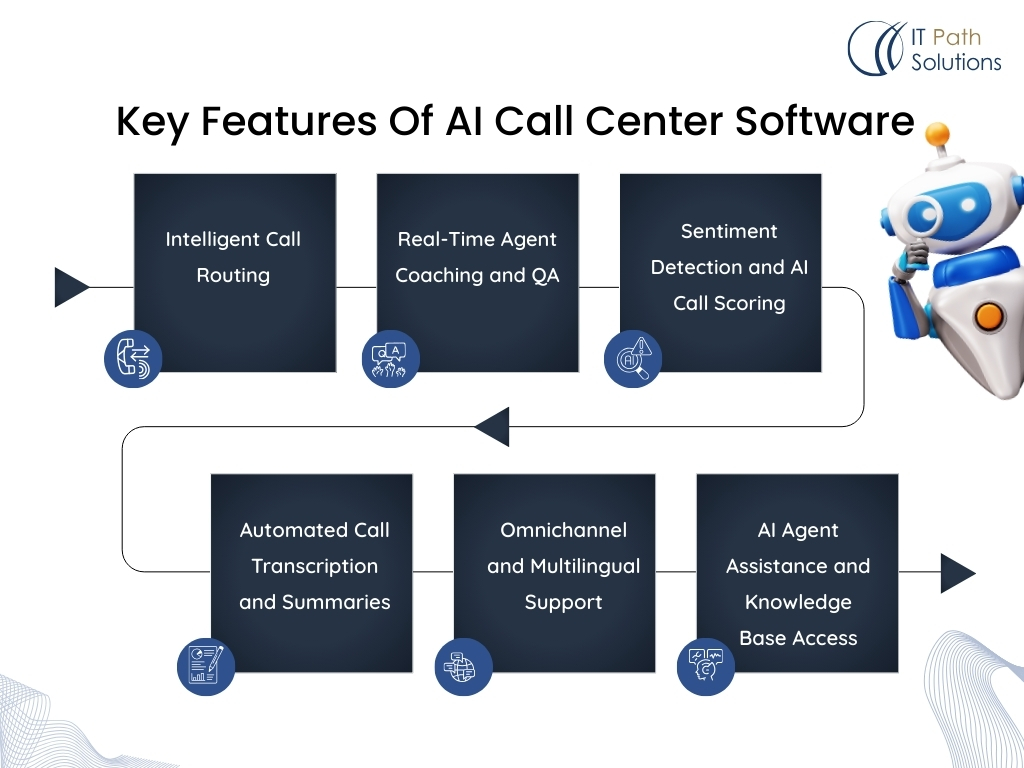
Modern AI call center platforms are not just about automation; they aim to enhance every stage of the customer and agent experience. Instead of offering isolated tools, they bring together tech-loaded features that create a seamless workflow across multiple channels.
Here are the standout features you should look for in AI call center software:
- Intelligent Call Routing: Directs customers to the most suitable agent or department based on intent, history, and priority, minimizing wait times and improving first-contact resolution.
- Real-Time Agent Coaching and QA: Provides on-screen prompts, compliance reminders, and feedback during live calls, while also scoring interactions for training opportunities.
- Sentiment Detection and AI Call Scoring: Detects emotions in voice and text, allowing agents to adjust tone and approach. Scores calls automatically for quality assurance.
- Automated Call Transcription and Summaries: Captures entire conversations in real time, generates summaries, and updates CRM records without human intervention.
- Omnichannel and Multilingual Support: Integrates calls, chat, email, and social media into a unified platform, with AI chatbots and translation tools that serve global audiences seamlessly.
- AI Agent Assistance and Knowledge Base Access: Presents relevant knowledge articles or policy guidelines instantly to agents during conversations. It significantly cuts handling time.
- Customizable Dashboards and Analytics: Provides supervisors with real-time performance data, workforce insights, and predictive alerts for informed decision-making.
By merging these features, AI call center software makes every interaction more efficient, empathetic, and uniform. It doesn’t just solve problems; it fosters relationships through reliability and precision.
Must-Know Insight: The best AI call center software amalgamates intelligent routing, real-time coaching, sentiment analysis, transcription, and omnichannel support to deliver quicker, more accurate, and more personalized customer experiences.
Benefits Of AI Call Center Software
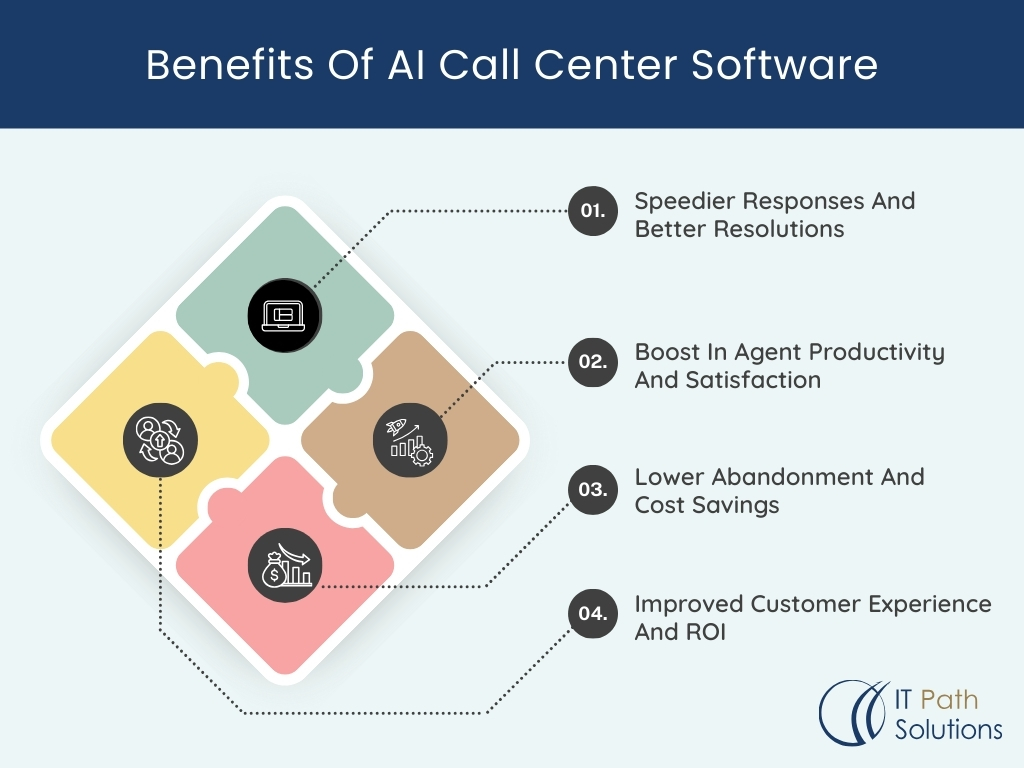
AI call center software is not limited to cutting costs or automating processes. Its actual value lies in how it improves the entire ecosystem of customer service, from the agent’s desk to the customer’s experience.
The following benefits highlight why organizations across industries are embracing these platforms.
Speedier Responses And Better Resolutions
AI reduces wait times, accelerates routing, and helps agents resolve issues on the first attempt. Customers no longer get bounced between departments. It results in:
- Improved First-Contact Resolution (FCR): Smart routing and real-time prompts enable agents to resolve queries during the first call.
- Reduced Average Handle Time (AHT): AI assists with instant access to the knowledge base and pre-filled summaries, shortening handling time.
Boost In Agent Productivity And Satisfaction
AI empowers agents rather than replaces them, removing repetitive work and allowing them to focus on high-value conversations. It leads to:
- Automated Administrative Tasks: Transcription, logging, and compliance tracking happen automatically.
- Personalized Coaching: Agents receive in-the-moment suggestions and quality feedback for continuous advancement.
Lower Abandonment And Cost Savings
AI helps businesses cut operational costs by eliminating friction, resulting in a reduction in customer frustration. The benefits are:
- Fewer Dropped Calls: Intelligent call distribution and chatbot availability ensure that no query is left unanswered.
- Operational Efficiency: Automation lowers staffing costs while still maintaining service quality.
Improved Customer Experience And ROI
The actual test of AI call centers is customer trust and loyalty, which comes from consistently positive interactions. For example:
- Higher CSAT Scores: Personalized interactions and reduced errors improve satisfaction rates.
- Proven ROI: Enterprises often experience measurable returns in the form of lower churn, higher efficiency, and stronger customer loyalty.
AI-powered call center software delivers tangible benefits at every level. It supports agents, delights customers, and fuels business efficiency, making it a cornerstone of present-day customer engagement.
In a Nutshell: AI call center software improves FCR, lowers handling time, boosts agent productivity, reduces abandonment, and increases CSAT. All this delivers cost savings and measurable ROI across industries.
AI For Better Customer Experience
Customer service has always been about more than answering questions. It involves building trust, resolving issues with care, and creating memorable moments that turn one-time buyers into long-term advocates.
AI call center software reinforces this mission by giving businesses the tools to personalize, predict, and deliver consistently reliable support at scale.
Here is how AI elevates customer experience.
Personalization At Scale
AI ensures that no two interactions feel the same by tailoring experiences to individual preferences and history.
- Context-Aware Conversations: AI remembers past purchases, preferences, and support tickets, offering a seamless experience across channels.
- Dynamic Recommendations: Customers receive product suggestions or solutions based on data-driven insights rather than generic scripts.
Proactive Support That Anticipates Needs
Instead of waiting for issues to arise, AI systems can anticipate customer needs and act before frustration builds.
- Predictive Analytics: AI identifies patterns and flags potential concerns, allowing proactive outreach.
- Automated Reminders: Notifications about renewals, payments, or updates create a smooth and stress-free customer journey.
Error Reduction And Consistency
Human errors in call handling can erode trust. AI minimizes mistakes while ensuring uniform quality across all channels.
- Real-Time Error Checks: AI monitors conversations to ensure compliance and accuracy.
- Consistent Tone and Service: Customers receive the same level of professionalism irrespective of whether they engage via phone, chat, or email.
AI enhances the call center experience not by replacing empathy but by empowering it. When technology handles the routine and predictive tasks, human agents can allocate more energy to moments that require genuine connection.
The Bottom Line: AI in call centers fortifies customer trust through personalization, predictive support, and reduced errors. It creates consistent experiences that turn routine interactions into meaningful relationships.
Use Cases Of AI Call Center Software
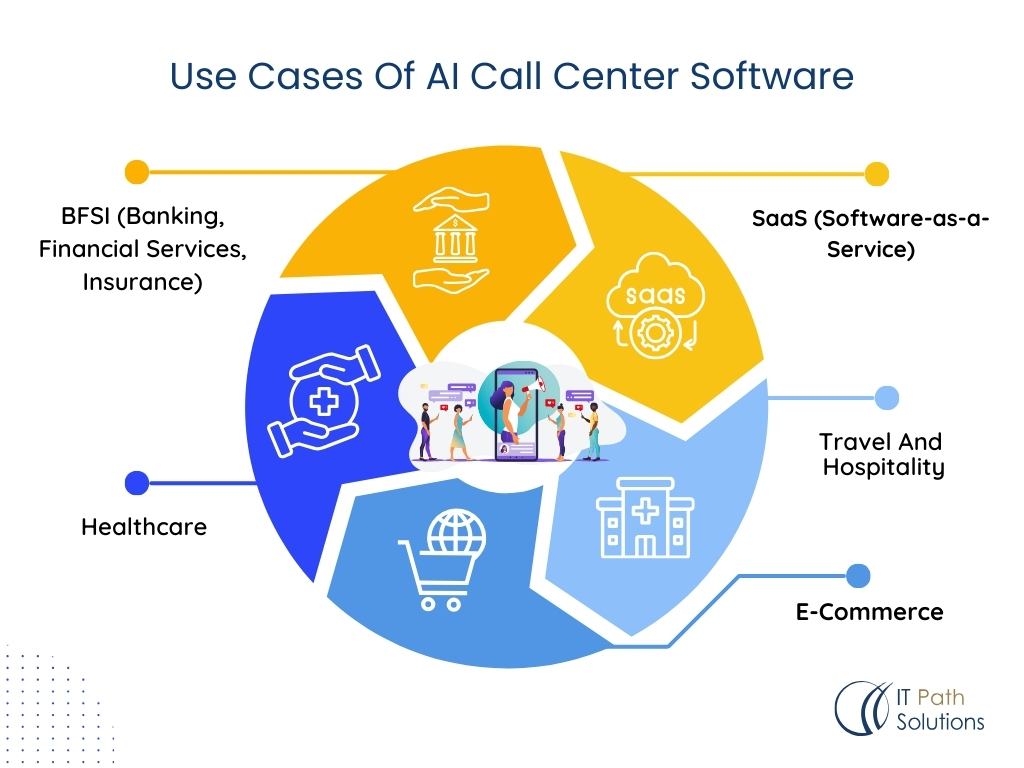
Every industry faces unique customer service problems. AI call center software adapts to these challenges by offering tools that respond to specific needs. It can be handling high call volumes, reducing wait times, or enabling multilingual communication.
Let us explore how different sectors are using AI to reimagine customer experiences.
BFSI (Banking, Financial Services, Insurance)
Financial institutions rely heavily on accuracy and trust. AI strengthens both by offering:
- Fraud Detection: Real-time pattern recognition flags suspicious transactions immediately.
- Shrewd Service Routing: Customers are directed to the ideal agent or chatbot for rapid resolution.
Healthcare
Healthcare providers use AI not only to improve efficiency but also to ensure patients feel supported. They employ:
- AI Virtual Assistants: Assist patients with appointment scheduling, test result queries, or medication reminders.
- Patient Support Bots: Handle routine inquiries, giving medical staff more time for complex cases.
E-Commerce
AI enhances the shopping journey by providing support that feels personal and instant. Here is how it benefits:
- 24/7 Order Management: Chatbots track orders, handle returns, and answer FAQs round-the-clock.
- Product Recommendations: AI suggests items based on past behavior, boosting sales and satisfaction.
Here is a valuable read for you: AI in eCommerce: How to Optimize Your Website for More Profit?
Travel And Hospitality
In a global market where travelers demand speed and convenience, AI provides both.
- Multilingual Support: AI translates customer queries in real-time.
- Booking Automation: Bots assist with reservations, itinerary changes, and travel alerts.
SaaS (Software-as-a-Service)
For subscription-driven businesses, AI helps reduce churn and strengthen loyalty. It provides:
- Agent Coaching: Real-time guidance ensures agents deliver precise and consistent answers.
- Churn Prediction: Predictive analytics spot customers at risk and suggest proactive outreach.
➡️AI call center solutions do not replace the human touch; instead, they provide sector-specific enhancements that make services speedier, more trustworthy, and more engaging.
Smart Summary: From finance to healthcare, AI-powered call centers deliver tailored solutions that improve efficiency, accuracy, and customer satisfaction. It frees up human agents to focus on tasks requiring empathy and expertise.
Hey! You might like reading this: What is SaaS? – Software As a Service
AI Call Center Software Pricing In 2025
Investing in AI call center solutions means counterbalancing short-term costs with long-term returns. Prices vary based on whether a business adopts a SaaS subscription model or invests in custom-built platforms.
Understanding these ranges helps leaders plan realistically and avoid hidden expenses.
SaaS Subscription Models
Many providers offer cloud-based AI call center software as a subscription. Pricing usually depends on the number of agents, feature depth, and support level. For instance:
- Small Businesses: Typically range from $50 to $150 per agent per month. It makes advanced features accessible without heavy upfront investments.
- Enterprises: May negotiate custom packages that exceed $300 per agent per month. It covers cutting-edge analytics, workforce optimization, and enterprise integrations.
Custom Development Costs
Organizations with unique workflows or compliance needs often prefer custom-built platforms. Though the upfront investment is higher, customization allows precise alignment with business processes.
Here is a tabular breakdown of development costs component-wise.
| Cost Component | Estimated Range (USD) | Description |
| Consultation & Requirements Analysis | $5,000 – $15,000 | Gathering business goals, compliance needs, and technical specifications. |
| UI/UX Design & Prototyping | $8,000 – $20,000 | Wireframes, customer journey mapping, and user-friendly interface designs. |
| Core Development | $40,000 – $150,000 | Building features like intelligent routing, dashboards, AI transcription, and monitoring tools. |
| AI & NLP Model Integration | $15,000 – $80,000 | Customizing or training models for sentiment analysis, predictive analytics, and multilingual support. |
| Backend & Third-Party Integrations | $10,000 – $60,000 | CRM, workforce tools, billing, and security integrations. |
| Testing & Quality Assurance | $8,000 – $25,000 | Performance, scalability, compliance, and bug checks. |
| Deployment & Infrastructure Setup | $5,000 – $20,000 | Cloud setup, environment optimization, and scaling. |
| Ongoing Maintenance & Upgrades | 15–25% annually of the initial cost | Continuous AI retraining, feature enhancements, and compliance updates. |
➡️Note: The costs may vary, and we have provided a rough estimation for your better comprehension.
ROI Considerations
The upfront cost matters less when weighed against measurable outcomes. Companies often see:
- 20 to 40 percent faster resolution times. It lowers operational costs.
- 15 to 30 percent higher CSAT scores. It improves customer loyalty.
Significant reductions in churn when predictive analytics and coaching tools are deployed.
AI call center pricing is not just about software licenses or development fees; it is about how quickly the system pays for itself through reduced workload, improved accuracy, and happier customers.
Essential Insight: Whether you prefer SaaS subscriptions or custom development, the tangible measure of AI call center pricing lies in ROI. Consider speed, satisfaction, and savings because they justify every dollar spent.
How To Choose The Right AI Call Center Software
Selecting the ideal AI call center platform is not just about features on a list. It is about choosing a system that works with your business goals, adapts to future growth, and delivers measurable advancements in efficiency and customer satisfaction.
A thoughtful evaluation avoids wasted investments and ensures your team and customers benefit from the technology.
Key Factors To Consider
- CRM and System Integration: Confirm compatibility with CRMs, workforce optimization systems, and reporting dashboards.
- Analytics and Insights: Watch out for AI speech analytics, call scoring, and sentiment detection that transform raw data into actionable improvements.
- Scalability: Ensure the platform can support you from startup growth through enterprise-level expansion.
- Omnichannel and Multilingual Support: Prioritize solutions that unify voice, chat, email, and social media while supporting multiple languages.
- User Experience: Shortlist platforms with simple, intuitive interfaces that reduce training needs and encourage adoption.
Build vs. Buy: Which Path Works For You?
| Factor | Buy (SaaS Subscription) | Build (Custom Development) |
| Deployment Speed | Quick rollout with minimal setup | Longer timelines due to design, development, and testing |
| Cost | Lower upfront costs, predictable monthly fees | Higher initial investment, variable maintenance expenses |
| Customization | Limited to the vendor’s roadmap | Fully customized features to match workflows |
| Control | The vendor manages the infrastructure and updates | Complete ownership of data, architecture, and integrations |
| Scalability | Easy to scale with vendor support | Requires proactive planning and additional development |
| Support | Vendor-provided training, support, and SLAs | Dependent on your in-house team or chosen partner |
10 Questions To Ask Your AI Vendor
- How does your solution integrate with our CRM and core systems?
- What level of customization is included?
- How do you ensure compliance with data security standards?
- Can the AI handle multiple languages and accents?
- How accurate is your sentiment analysis?
- What analytics and reporting dashboards are available?
- Can the platform scale from small to enterprise teams?
- What training and onboarding support do you provide?
- How do you price upgrades and advanced features?
- Can you share ROI metrics from existing clients?
Knowledge Drop: The best AI call center software is not always the one with the most features. It is the solution that integrates smoothly, grows with your business, and delivers tangible value. Use structured evaluation and thoughtful vendor questions to make an informed decision.
Best AI Call Center Software In 2025
Choosing the right platform is more effortless when you can compare options side-by-side. Below is a snapshot of the leading AI call center solutions for 2025. Each product has its strengths, and your selection depends on your unique goals, scale, and workflow.
| Software | Strengths | Notable Features | Best For |
| TeleCMI | Deep integration with Indian telecom APIs | IVR bots, automated summaries | Rapid deployment in regional markets |
| Convin | Custom AI models and coaching | Agent QA, AI whisper, scoring | Enterprises seeking agent excellence |
| MyOperator | Simple interface and strong SMS integration | Cloud telephony, CRM sync | Small to mid-size businesses |
| CallHippo | Global reach and flexible pricing | Multi-language IVR, dashboards | Startups and remote teams |
| LiveAgent | Rich omnichannel support and analytics | Chat, email, calls, reporting | Teams with diverse communication needs |
Each of these tools offers a blend of contact center AI platform features like intelligent routing, sentiment detection, and omnichannel capabilities. Your final pick should align with size, budget, integrations, and your long-term roadmap.
What You Should Know: Do not choose AI call center vendors on popularity alone. Scrutinize closely integration, feature alignment, pricing, and support to determine the tool that will actually boost team performance.
AI Call Center Future Trends
The call center landscape is entering a new era, driven by technologies that do more than automate – anticipate, analyze, and adapt. Assessing the current scenario, several trends are set to redefine how businesses engage with their customers.
Let us walk you through the pivotal ones.
Generative AI For Personalized Conversations
Instead of canned responses, generative AI can create context-aware dialogues that adapt in real-time. Imagine a customer feeling like every interaction is crafted uniquely for them.
Predictive Intent Recognition
AI will anticipate why a customer is reaching out before they explain by analyzing caller behavior and historical data. It reduces friction, shortens call times, and builds customer confidence.
AI-Driven Workforce Optimization
AI will not only route calls but also optimize agent schedules, match skill sets to cases, and monitor workload balance, creating efficient teams while reducing burnout.
Conversational AI Beyond Voice
Chatbots, messaging apps, and even video-based assistants will expand customer choice. A genuine omnichannel experience means customers can start in one channel and conclude in another without repeating themselves.
Ethics And Human-AI Collaboration
Future growth requires trust. Businesses will adopt guidelines to ensure AI supports human empathy. Transparency in AI decisions will become a competitive advantage.
Key Takeaway: The future of AI call centers is not just speedier interactions, but tech-driven, more empathetic connections. The organizations that blend predictive technology with human insight will lead the customer experience in 2025 and beyond.
➡️We suggest checking out this blog to understand the game-changing role of AI in the supply chain.
Why TeleCMI Is The Best Choice
The AI call center market is crowded with vendors promising faster, savvier, and economical solutions. However, not every platform delivers astonishing results that match the hype. TeleCMI outshines competitors because it combines advanced technology with usability, scalability, and measurable impact.
Let us look at what makes it stand out.
Unique Strengths of TeleCMI
Before choosing any platform, it is crucial to assess what unique strengths it brings to the table. TeleCMI offers several that consistently deliver value:
- Comprehensive AI Suite: Includes intelligent call routing, real-time agent assist, transcription, and AI dashboards.
- Cloud Flexibility: Deployable for startups as well as large enterprises without sky-high infrastructure costs.
- Proven Scalability: Handles thousands of calls daily while maintaining performance.
- Seamless Integrations: Connects with CRMs, ticketing systems, and workforce tools to unify workflows.
These strengths demonstrate how TeleCMI builds trust by aligning technology with human interaction.
Businesses choose it not just for features, but for the way it transforms customer and agent experiences. TeleCMI is both a technology provider and a strategic partner.
Quick Recap: TeleCMI blends innovation, scalability, and real-world results. For organizations seeking the best AI call center software in 2025, it offers a rare combination of cutting-edge AI and meaningful business impact.
Conclusion
The shift from traditional call centers to AI-powered platforms is already underway and gaining speed. Businesses that embrace these solutions are reaping measurable gains in efficiency, customer satisfaction, and cost reduction.
AI call center software goes beyond automation, enabling conversations that feel personal, timely, and consistent across every touchpoint.
For decision-makers evaluating their next move, the path is clear. Success lies in choosing solutions that integrate seamlessly with existing systems, align with business goals, and empower both agents and customers.
At IT Path Solutions, we specialize in designing and developing AI-driven call center solutions tailored to your business needs. Whether you are a small business seeking affordable scalability or an enterprise in need of custom integrations, our team can help you craft a platform that delivers real-world impact.
The future of call centers is already here. The only question is when your organization will take the step toward creating experiences that customers will remember and competitors will envy.
FAQ
How Does AI Improve Call Centers?
AI enhances call centers by automating repetitive tasks, shortening wait times, providing real-time agent coaching, and offering personalized customer experiences. It also delivers predictive insights to refine first call resolution and overall service quality.
Will AI Replace Human Agents?
AI will not replace human agents. Instead, it complements them by handling routine tasks and providing insights during complex interactions. This collaboration allows agents to focus on high-value conversations that require empathy and critical thinking.
Which AI Call Center Software Is Best?
The best AI call center software depends on your business needs. Options like TeleCMI, Convin, CallHippo, and LiveAgent excel in features such as real-time analytics, multilingual support, and CRM integration. A side-by-side evaluation ensures the right fit.
How Much Does AI Call Center Software Cost?
Costs vary by deployment and scale. SaaS subscriptions may start at $50–$150 monthly per agent, while custom enterprise solutions can cost tens of thousands annually. The final pricing depends on features, integrations, and expected call volumes.
What Industries Benefit Most From Call Center AI?
Industries with high customer interaction see the most benefit. BFSI uses AI for fraud detection and compliance, healthcare leverages it for patient support, e-commerce for order management, travel for multilingual booking, and SaaS for churn prediction and customer care.
How Do You Implement AI In An Existing Call Center?
Implementation usually begins with identifying goals such as reducing call wait times or redefining customer satisfaction. Integration with CRM, training AI models on existing data, and phased rollout with agent oversight are key to smooth adoption.
What Metrics Prove The ROI Of AI Call Center Software?
ROI can be measured through metrics, such as reduced average handling time (AHT), higher first call resolution (FCR), lower abandonment rates, improved customer satisfaction scores (CSAT), and decreased training costs due to real-time agent assist.
Can AI Call Center Software Handle Multilingual Support Effectively?
Yes. Many platforms now have natural language processing (NLP) and translation tools that enable real-time interactions across multiple languages. It makes it possible to support global customers without hiring large multilingual teams.

Keyur Patel
Co-Founder
Keyur Patel is the director at IT Path Solutions, where he helps businesses develop scalable applications. With his extensive experience and visionary approach, he leads the team to create futuristic solutions. Keyur Patel has exceptional leadership skills and technical expertise in Node.js, .Net, React.js, AI/ML, and PHP frameworks. His dedication to driving digital transformation makes him an invaluable asset to the company.
Related Blog Posts
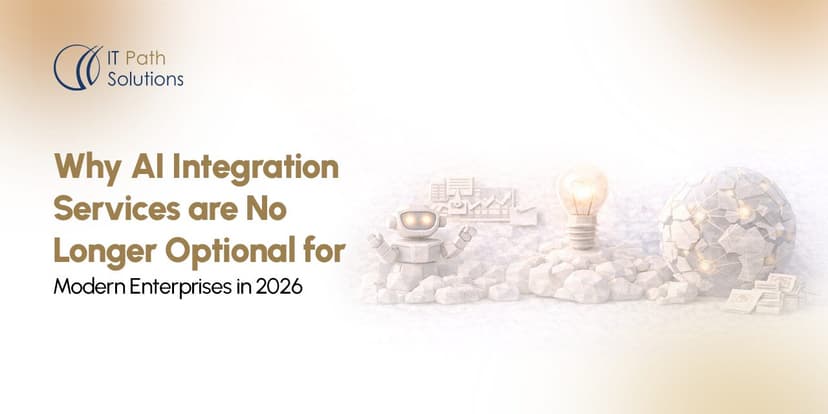
Why AI Integration Services are No Longer Optional for Modern Enterprises in 2026
Focus keyword: Al integration services Search intent: Informational/Commercial companies exploring automation and Al solutions. Keywords: Artificial Intelligence Solutions Ai for Business Automation Machine Learning Integration Ai Development Company Digital Transformation with Ai It is Monday morning, December 2025. CEO A (The Traditionalist) walks into his office. His inbox is overflowing with 200 unread emails. His… Why AI Integration Services are No Longer Optional for Modern Enterprises in 2026

Complete Guide to PHP Versions: When Should You Upgrade to the Latest Version?
Running a website on outdated PHP versions is like driving a car without insurance. Everything seems fine until something goes wrong. With over 77% of websites using PHP, understanding PHP version support timelines isn’t just technical jargon; it’s critical for your business security, performance, and user experience. Current PHP Versions and Support Status As of… Complete Guide to PHP Versions: When Should You Upgrade to the Latest Version?

Automated Lead Qualification By Phone: AI vs. Human Reps
Imagine losing half of your potential customers merely because no one answered the phone fast enough. It is a critical concern many businesses face in 2025, where competition is relentless and patience is almost nil. Phone-based lead qualification remains the lifeline for companies across healthcare, finance, real estate, and SaaS industry verticals. Every missed or… Automated Lead Qualification By Phone: AI vs. Human Reps

